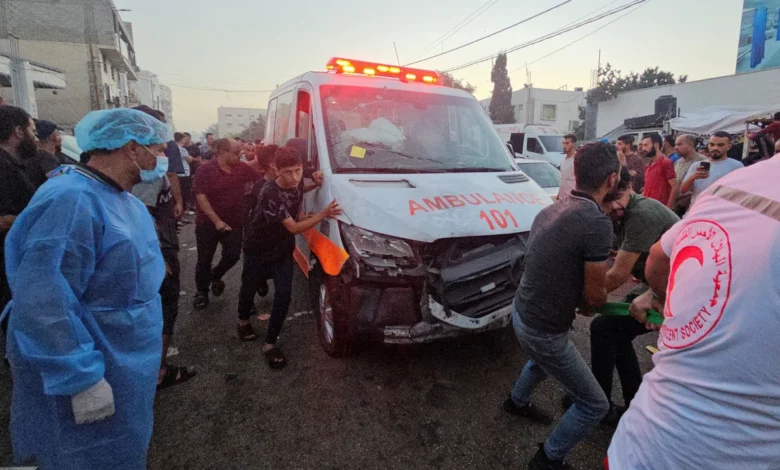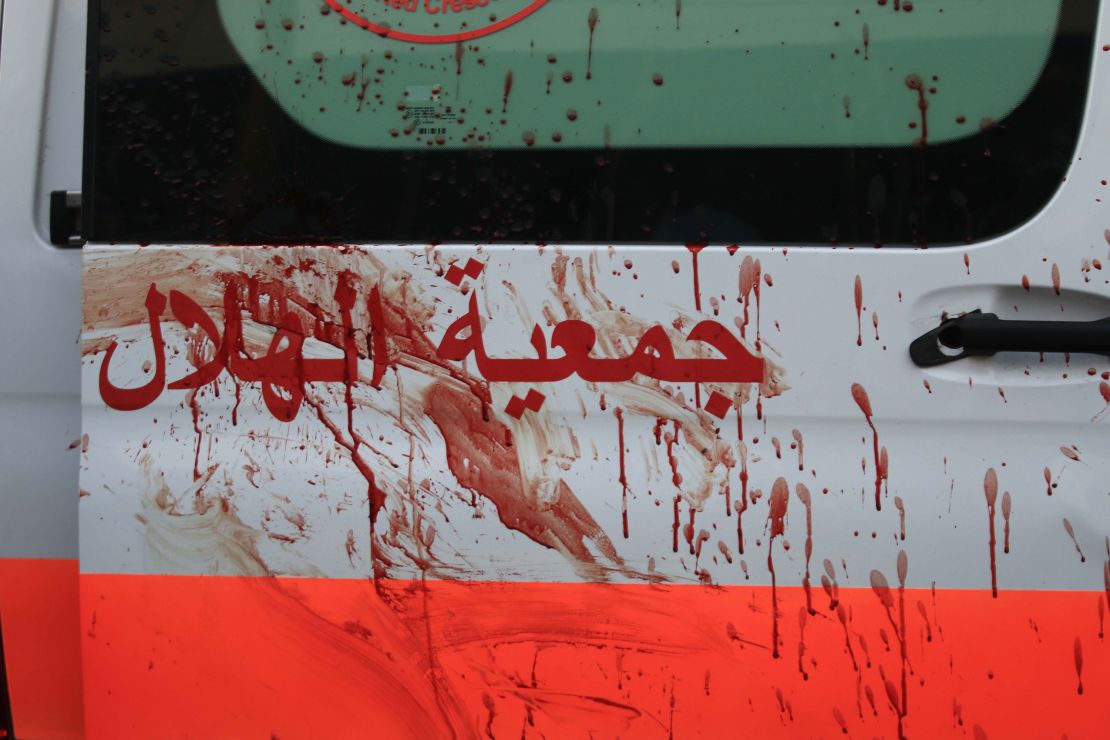
At least 15 people were killed and 50 others wounded, the Hamas-run health authorities said Friday. Footage from the scene showed at least a dozen bloodied casualties strewn across the ground near an ambulance. There appears to be some shrapnel damage to at least one of the cars on the scene.
Israel said it had targeted the ambulance because it was being used by Hamas, according to a statement from the Israel Defense Forces (IDF). “An IDF aircraft struck an ambulance that was identified by forces as being used by a Hamas terrorist cell in close proximity to their position in the battle zone,” it wrote.
“A number of Hamas terrorist operatives were killed in the strike… We have information which demonstrates that Hamas’ method of operation is to transfer terror operatives and weapons in ambulances,” the statement said.
The ambulance strike prompted UN Secretary-General Antonio Guterres to reiterate his calls for a cessation of fire on Gaza, something Israel has rejected.
“I am horrified by the reported attack in Gaza on an ambulance convoy outside Al Shifa hospital,” Guterres said in a statement.
“The images of bodies strewn on the street outside the hospital are harrowing,” he said, adding: “I do not forget the terror attacks committed in Israel by Hamas and the killing, maiming and abductions, including of women and children. All hostages held in Gaza must be released immediately and unconditionally.”
“Now, for nearly one month, civilians in Gaza, including children and women, have been besieged, denied aid, killed, and bombed out of their homes,” he said, “This must stop.”
A spokesperson for the Palestinian Ministry of Health in Gaza, who was at Al-Shifa Hospital, said that Israel was responsible for the attack.
The Palestine Red Crescent Society (PRCS) said one of its ambulances was in the convoy but that none of its team members were injured in the strike.
The ambulance was damaged when a shell fell near it, the PCRS said. “Upon arrival at Al-Shifa hospital’s gate, the gate was targeted again,” PRCS said, adding that a separate Ministry of Health ambulance was then directly hit and dozens of civilians in the area were killed and injured.

Dr. Ashraf Al-Qidra said that authorities had organized the medical convoy from the hospital and had informed the International Committee of the Red Cross (ICRC) about the move.
He said the convoy was traveling to the Rafah Crossing – the border in the south of the besieged enclave has been seen as the last hope for Gazans to escape as Israel’s bombs rain down on the strip.
“When the ambulances moved towards the south, the occupation [Israel] targeted the ambulances in multiple locations, including on the gate of Al-Shifa medical compound,” he said. “The Israeli occupation targeted intentionally those ambulances.”
The ICRC confirmed to CNN it received a request to accompany the convoy prior to it leaving. But while it was aware of the scheduled movement of a convoy of vehicles carrying wounded patients from northern Gaza to the south of the enclave on Friday, it was not part of it, it said in a later statement.
“Even if we were not present, this is still medical convoy, and any violence towards medical personnel is unacceptable,” the ICRC said “No doctors, nurses, or any medical professionals should ever die while working to save lives.”
Besieged hospitals
Al-Shifa Hospital has increasingly found itself part of the frontline as Israel last week claimed that the facility is the site of a significant Hamas command and control center.
Palestinians have rejected the Israeli army claim. The Director General of the Gaza Health Ministry, Dr. Medhat Abbas, told CNN last week that Gaza’s hospitals “are used to treat patients only” and are not being used “to hide anyone.”
Hamas also rejected the claim, calling on “the United Nations, Arab and Islamic countries to immediately intervene to stop the madness of bombing and destroying the medical system.”
It is located in one of the most densely populated areas on earth, the 140-square-mile Gaza Strip, which is being pounded and encircled by the Israeli military.
Calls for a ceasefire by Hamas, aid organizations, and much of the global community have been rejected categorically by Israel’s government, which has vowed to wipe out Hamas after its terror attack last month, which massacred more than 1,400 Israelis, most of them civilians.
In Gaza, the civilian casualties have continued to rise as Israel strikes large residential neighborhoods, schools, and some areas immediately around hospitals, in what it says are military target strikes. More than 9,100 people have been killed in Israeli attacks is the Strip since October 7, according to the latest figures from the Palestinian Ministry of Health in Ramallah, which drew from sources in the Hamas-controlled enclave.
The bombardment has overwhelmed Gaza’s medical institutions, now struggling to run amid dwindling supplies and fuel.
In his statement on the ambulance strike, Guterres also called attention to the dire humanitarian situation in Gaza.
“The humanitarian situation in Gaza is horrific. Not nearly enough food, water and medicine are coming in to meet people’s needs. Fuel to power hospitals and water plants is running out,” he said.
Medical staff at Al-Shifa are exhausted, and low fuel stocks have plunged wards into darkness, cutting off basic functions like oxygen generation. Only one operating theater, the emergency department, and the intensive care unit (ICU) continue to function, Dr. Yousef Abu Al-Rish, director of the hospitals in Gaza, said in a video obtained by CNN.
Doctors at Al-Shifa are seeing children with the majority of their body and faces burned, missing limbs and other “catastrophic injuries,” said Dr. Tanya Haj-Hassan, a pediatric intensive care and humanitarian doctor with the aid group Doctors Without Borders, also known as Médecins Sans Frontières.
Doctors are also having to treat patients with limited pain control as they are “running out of anesthetic drugs.” she told CNN. “We do not have enough antibiotics to treat wound infections, we don’t have enough dressings.”
CNN’s Abeer Salman, Kareem El Damanhoury, and Kareem Khadder contributed to this report.




